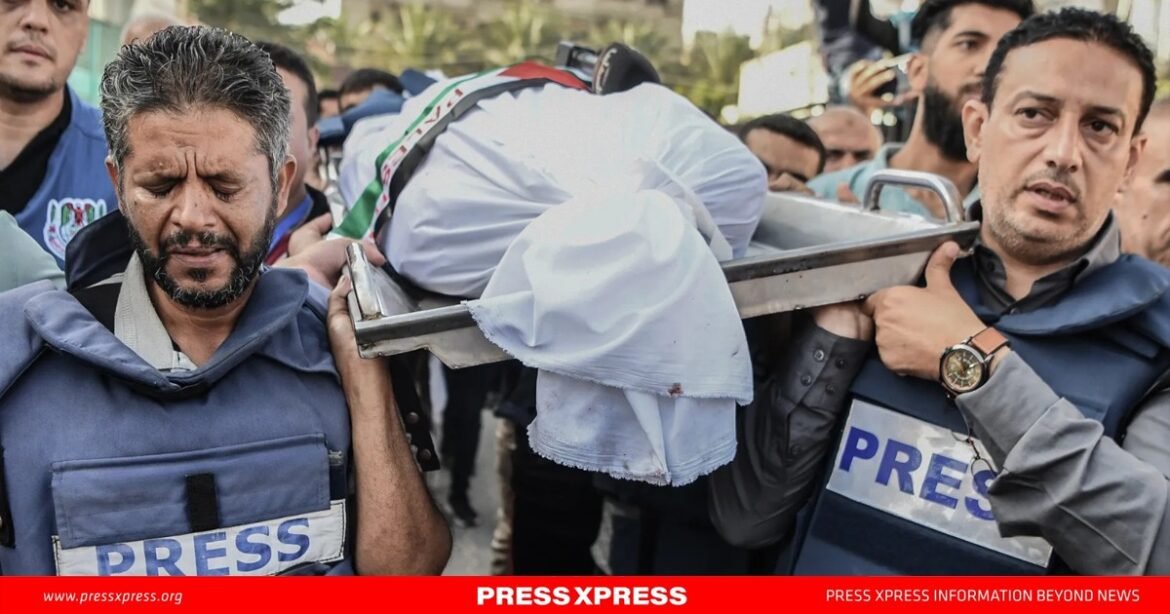The profession of journalism, often heralded as a cornerstone of democracy, has turned perilous across the globe. From war-torn regions to relatively peaceful nations, journalists are under siege, facing threats ranging from censorship and defamation charges to outright murder. Recent UNESCO reports indicate a stark rise in violence against journalists, particularly in conflict zones, where impunity reigns supreme. In Gaza alone, over 130 journalists have been killed, highlighting the dangers of reporting from volatile areas. This article delves into the alarming global trends of violence and repression faced by journalists, with a specific focus on regions like Bangladesh and sub-Saharan Africa, where the profession has been rendered increasingly hazardous.

Global Threats to Journalists: A Growing Crisis
The latest data from UNESCO paints a grim picture. In conflict zones, journalist killings have surged, reversing a five-year decline. Between 2022 and 2023, deaths doubled, with 14 journalists killed in sub-Saharan Africa this year alone. These fatalities occurred predominantly in countries experiencing civil wars or political instability. Beyond murder, enforced disappearances, unlawful detentions, and torture remain pervasive. UNESCO and Reporters Without Borders (RSF) documented 32 journalists detained and 14 disappeared in sub-Saharan Africa in 2024.
The threats extend beyond war reporting. Environmental journalists now face heightened risks, reflecting the contentious nature of climate change coverage. A UNESCO report from May 2024 revealed that 70% of journalists covering environmental issues have experienced attacks, harassment, or threats. These incidents highlight a disturbing pattern: as topics become more politically or economically sensitive, those who report on them become targets.
Despite these alarming trends, global mechanisms for protecting journalists remain weak. Most countries fail to prosecute crimes against journalists, allowing perpetrators to act with impunity. This failure to deliver justice perpetuates the cycle of violence, emboldening those who seek to silence dissent.
Gaza: Journalism as a Death Sentence
Nowhere is the targeting of journalists more pronounced than in Gaza. According to The Guardian and NBC News, between 134 and 147 journalists and media workers have been killed as of November 2024, alongside 120 academics and over 224 humanitarian workers. Most deaths occurred during Israeli military strikes, with journalists often directly targeted while reporting from the frontlines.
The international reaction has been muted. Western governments, typically vocal about press freedoms, have largely ignored these killings. This silence has drawn criticism from advocacy groups, who argue that selective outrage erodes the credibility of global efforts to protect journalists. The lack of accountability in Gaza sets a dangerous precedent, signaling to other nations that targeting journalists will have no meaningful consequences.
Bangladesh: A Systemic Crisis
In Bangladesh, the dangers for journalists are less about direct violence and more about systemic harassment and impunity. Since 1992, 26 journalists have been killed, yet not a single case has been fully resolved, according to the Committee to Protect Journalists (CPJ). Investigations into these murders are often slow and inconclusive, with cases disappearing into bureaucratic limbo.
Recent months have seen an alarming trend: mass lawsuits targeting journalists. In Dhaka, Chattogram, Bogura, and Rajshahi, 129 journalists have faced charges ranging from defamation to murder.
Bangladesh’s interim government has revoked the press accreditations of 167 journalists between October 29 and November 7, sparking widespread criticism from rights groups and journalist associations. The move, carried out under the 2022 Press Accreditation Policy, has been described as a threat to press freedom, with journalists affected losing access to government ministries and official events.
The Editors’ Council condemned the decision, warning it fosters censorship, while Reporters Without Borders called it “incomprehensible,” citing its potential to encourage self-censorship. Transparency International Bangladesh criticized the action as indicative of authoritarianism.
These concerns echo those raised in a recent U.S. State Department briefing, where spokesperson Vedant Patel addressed questions from Dastagir Jahangir, USA Bureau Chief of Press Xpress, on the press accreditation issue. Patel affirmed the U.S. government’s “strong point of view” on press freedom, calling it “vital” for reporting on current events, including those in Bangladesh.
What Needs to Change
The solution starts with accountability. Organizations like the Committee to Protect Journalists (CPJ) have urged governments to repeal draconian laws, such as Bangladesh’s Official Secrets Act, and dismiss politically motivated cases. Structural reforms, such as media commissions to safeguard press independence, are crucial but must be backed by strong enforcement mechanisms.
International pressure is equally vital. Global institutions need to hold states accountable for crimes against journalists. Financial and diplomatic leverage could force governments to take journalist safety seriously. Countries with strong press freedom records must lead by example, using their influence to push for global standards.
Why It Matters
The cost of ignoring this crisis extends beyond the lives lost. When journalists are silenced, corruption thrives, human rights abuses go unchecked, and the public is left in the dark. The stakes are global: a free press is not merely a regional issue but a pillar of democracy worldwide.
Gaza, Bangladesh, and sub-Saharan Africa offer different snapshots of the same alarming trend. Unless addressed, this war on journalism will erode the foundations of accountability and governance. The world cannot afford to lose its watchdogs. It’s time to protect those who protect the truth.


